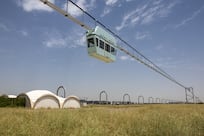Abu Dhabi's onshore oil company is so sure carbon dioxide is the key to unlocking the emirate's oil reserves it is to launch a second full-scale project by the middle of decade, executives say.
The project, approved by the Abu Dhabi National Oil Company (ADNOC), will gather carbon dioxide from the company's gas-processing plant at Habshan and inject it into the giant onshore Bab field in the southwest of the capital.
ADNOC says by 2014 it will start another effort to inject carbon dioxide from a Musaffah steel plant into the Rumaitha field.
Carbon dioxide is set to gradually replace natural gas as the company forces more oil out of its ageing reservoirs, said Qasem al Kayoumi, the manager for ADNOC's reservoir engineering.
Mr al Kayoumi said carbon gas would free up valuable natural gas and enhance oil output in the short run, forming a key part of Abu Dhabi's efforts to reduce greenhouse gas emissions in the longer term by locking away carbon for permanent storage. "The introduction of carbon dioxide will be a major change for us," he said on the sidelines of an oil conference. "It's part of our social responsibility."
The Abu Dhabi Company for Onshore Oil Operations (ADCO), the ADNOC subsidiary responsible for implementing both carbon injection projects, envisaged significant advantages in using the gas. But this must be balanced against increased costs, said Shahin Nagahban, the manager for ADCO's enhanced oil recovery.
Carbon dioxide dissolves in oil and could free up as much as 1.5 billion barrels of oil locked in geological walls between layers of oil and gas, Mr Nagahban said.
ADNOC officials have raised concerns about the high cost of using carbon dioxide obtained from Masdar, Abu Dhabi's clean energy company, which plans to filter it from three power plants and the steel mill in Musaffah. But for the Bab project, ADNOC will also source carbon dioxide from its own network of plants, said Omar al Suwaidi, the manager for the onshore division of the directorate of exploration and production.




